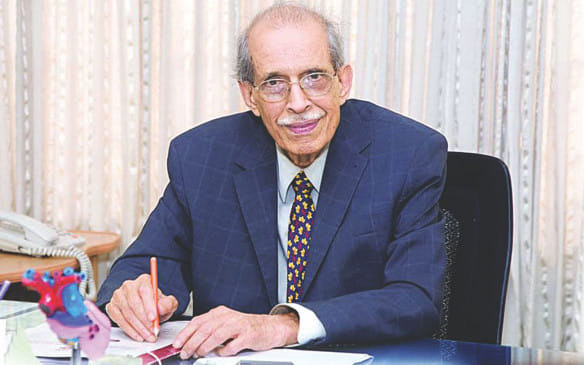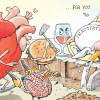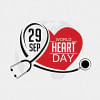“Take care of your heart, don't let it fall apart”

The life of an average human being who has entered adulthood turns into an endless cycle of the same routines that include distorted sleep schedules, missed breakfasts and meeting deadlines. Life has now become synonymous with the motto "time is money."
But do we ever stop to wonder the toll it takes on the most important organ of our body—the heart?
According to a study by WHO in 2016, almost 17.7 million people die each year from cardiovascular diseases and an estimated 31 percent of all deaths occurred worldwide. Four out of five cardiovascular disease related deaths are due to heart attacks and strokes. With the increasing use of technology, people's physical activities have reduced which is why cardiovascular or non-communicable diseases are such a major threat to people's health today.
According to data published by WHO in 2017, coronary heart disease deaths in Bangladesh reached 112,791 or 14.31 percent of total deaths and it's increasing at an alarming rate. National Professor Brig (Rtd) Abdul Malik, founder of National Heart Foundation Bangladesh, has been dedicated to his vision of helping people with non-communicable diseases and creating awareness about cardiovascular diseases since the inception of the foundation in 1978. He says that just a few years ago, the greatest threat to people's health in Bangladesh was communicable diseases. However, with the advent of technology and joint efforts of the government, NGOs and international organisations like WHO, these diseases have almost ceased to exist. But on the flipside, the incidence of non-communicable diseases like hypertension, diabetes, and cancer has increased.
When asked to give an overview on cardiovascular diseases in Bangladesh, he states: "In Bangladesh the main cause of heart disease is hypertension. Hypertension is known as the 'silent killer' as a lot of people remain unaware of its presence in their body as it slowly turns chronic resulting in stroke or heart failure." According to the National Guideline for Management of Hypertension in Bangladesh, hypertension or high blood pressure is the most common cardiovascular disorder, affecting about 40 percent of the adult population. In Bangladesh, approximately 11-18 percent of adult and 40-65 percent of elderly people suffer from hypertension. Professor Abdul Malik further goes on to state, "17.9 percent of adults aged 25 years and above amongst the Bangladeshi populace are seen to have hypertension. The tragic part is once it hits you at such a young age, hardly anything can be done to fully treat it as treatment is often lifelong and takes on a tremendous financial toll on the patient."
In case of Ischemic heart disease, fat accumulates in the coronary artery gradually over the years of adulthood due to unhealthy eating habits. The coronary arteries supply blood to the heart muscle and no alternative blood supply exists, so a blockage in the coronary arteries reduces the supply of blood to the heart muscle. When a clogged artery completely blocks blood flow, a heart attack occurs. Professor Abdul Malik calls this the "Lifestyle Disease" and says, "These sorts of diseases are completely due to the fault of the patient themselves as leading an unhealthy lifestyle—smoking, having unhealthy eating habits and lack of physical activity—is the root cause."
When asked about the treatment facilities for non-communicable diseases, Professor Abdul Malik comments that while these diseases are on the rise, the facilities available for treatment in Bangladesh are not enough to meet the demand of the people. He says, "At the government level, NICVD and BSMMU have adequate facilities. Besides that, private institutions like ours (National Heart Foundation Bangladesh) have been passionately working to educate and open up scope for treatment of such diseases. But our efforts alone will not suffice given that we have a population of 16 crore people."
Professor Abdul Malik also mentions the issue of obesity in children and how that might lead to an epidemic of cardiovascular diseases. "Children of this generation barely have avenues for physical activities and have a distant relationship with fruits and vegetables. Furthermore, they are very attached to electronic devices, preventing them from carrying out physical activities, thus increasing the risk of cardiovascular diseases at an adult age."
When asked about how one can prevent such diseases, Professor Abdul Malik says, "People need to include the habit of walking in their everyday schedules alongside eating more fruits and vegetables, avoiding smoking and reducing stress." He also says that awareness is key to preventing such diseases and says, "Facilities concentrated in Dhaka for the treatment and awareness of cardiovascular diseases need to be dispersed divisionally and we need tremendous government support to defeat the epidemic rise of such diseases."
When asked about what the structural steps should be to induce better treatment for non-curable diseases, Professor Abdul Malik states, "Besides making basic health education compulsory in every sphere of society, we need preventive programmes on non-curable diseases in terms of screening and follow-up. Additionally, emergency treatment should be made available at all times and steps should be taken to make these services available at all district levels."
On World Heart Day this year, the motto is "My Heart, Your Heart – make your promise." Let's start our tomorrow with the promise of taking care of our hearts.
The interview was taken by Nazifa Raidah.




 For all latest news, follow The Daily Star's Google News channel.
For all latest news, follow The Daily Star's Google News channel. 















Comments